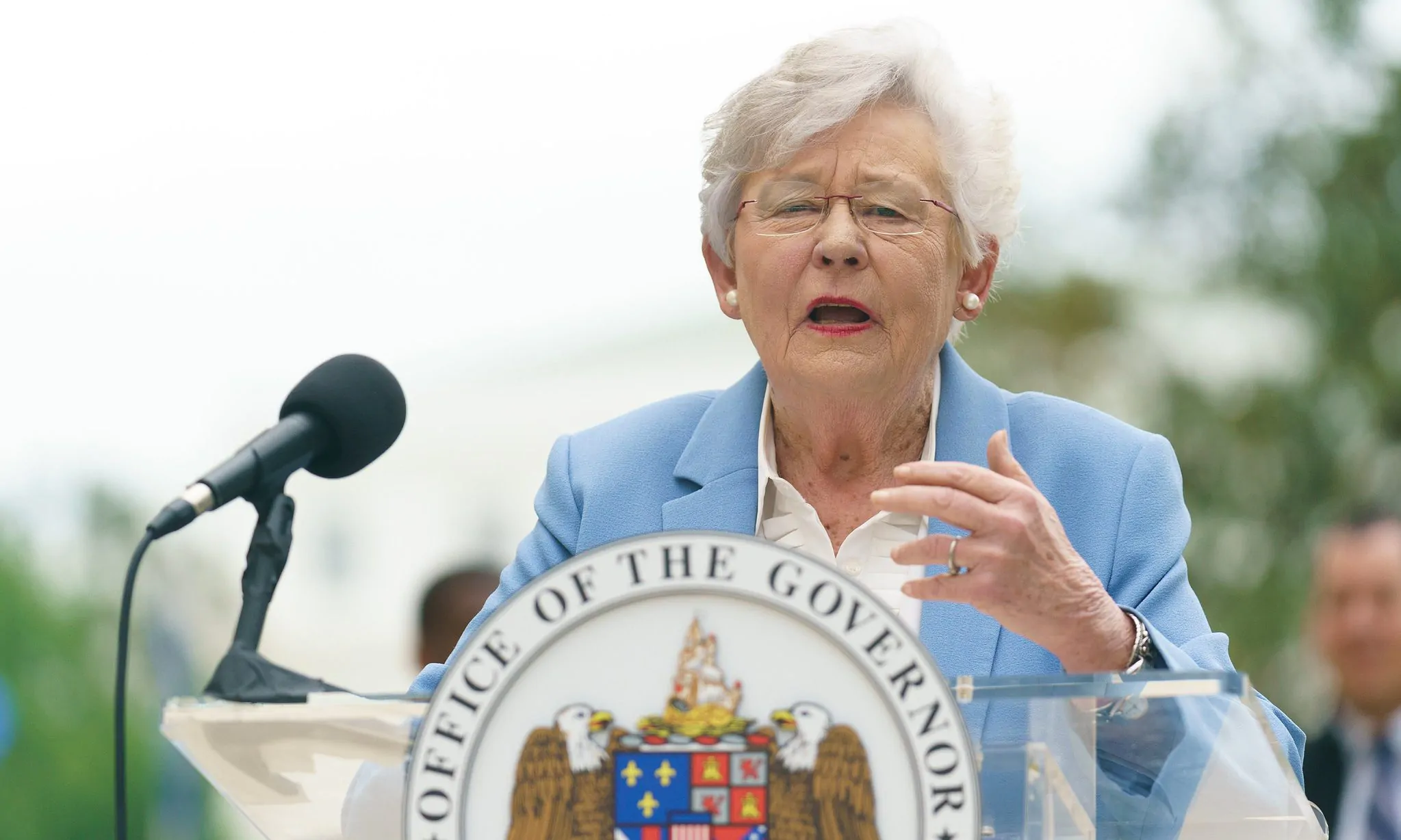Alabama Gov. Kay Ivey on Thursday refused to sign a controversial piece of legislation that would have taken spending authority over most of the $1.9 billion in CARES Act funds for Alabama away from the governor and given authority to the Legislature instead.
“I have reviewed Senate Bill 161 and believe that all federal CARES Act funds should be appropriated immediately,” Ivey said in an official message to the Legislature, saying she didn’t want to decide how the money could be spent but that it needs to be appropriated and spent as soon as possible.
If the money isn’t spent — not just appropriated — by the end of the year, it would return to the federal government, and Alabama would lose any money not spent. The governor’s amendment essentially forces the Legislature to make a decision on how to appropriate the funds now instead of waiting for a special session.
Ivey has said she is not willing to let the money, intended only for COVID-19 expenditures, go to waste.
“Alabama’s total share of the CARES Act funds is a little over $1.9 billion,” Ivey said in a statement. “That’s a lot of money for sure, and if spent wisely, it could very well help us pay for many legitimate expenses incurred by cities, counties and the state, nursing homes and hospitals, schools and colleges — and other worthy expenditures – that are directly connected to COVID-19.”
The governor and the GOP-controlled Legislature have been in a rare public battle over how to use the CARES Act funding and the process by which the money can be spent. In the CARES Act, Congress and the president gave governors across the country control of the money so they could spend it quickly to address the economic and public health crisis caused by COVID-19.
The governor has criticized the Legislature for delaying the funds and for suggesting in a lawmaker-written “wish list” that $200 million of the COVID-19 emergency funding should be spent to build a new State House for the Legislature.
In the version of the bill the Legislature sent to the governor earlier this week, the Legislature allocated only $200 million of the $1.9 billion for the governor to pay for more immediate expenses.
The rest would have to be appropriated in a special session later this year. The governor has said she won’t call a special session unless the Legislature provides a full list of how it plans to appropriate the money, saying she fear the money could be appropriated behind closed doors.
Instead of signing the legislation, Ivey sent it back to the Legislature with an executive amendment, which doesn’t amount to a full veto but is nonetheless used by governors to slow, block or force changes to bills.
“The purpose of this amendment is simple: To ensure that the CARES Act money is immediately put to use for the purposes Congress and President Trump intended,” Ivey wrote in a letter to the Legislature.
Ivey said she would sign the General Fund and Education Trust Fund budgets but provided the executive amendment to the supplemental appropriations bill that would appropriate the CARES Act dollars.
“Let me be clear,” Ivey said in the letter to lawmakers. “I know the Alabama Constitution gives the Legislature the authority to appropriate funds. Again, I never had any interest in controlling where this money goes; I simply believe it should go where it can do the most good to help the most people who have been adversely affected by this deadly and costly disease. We have but one opportunity to get this right for Alabama.”
{{CODE1}}
The proposed executive amendment would give the executive and the Department of Finance control of the $1.8 billion in federal CARES Act funds to be used for certain costs:
- Up to $300 million to reimburse state agencies for COVID-19 expenditures
- Up to $250 million to reimburse local governments for COVID-19 expenditures
- Up to $250 million to “support the delivery of healthcare and related services to citizens of Alabama related to” COVID-19
- Up to $300 million to support citizens, businesses and non-profit and faith-based organizations impacted by COVID-19
- Up to $53 million for reimbursement of equipment and infrastructure necessary for remote work and public access to functions of state government impacted by COVID-19
- Up to $300 million for technology and infrastructure for remote instruction and learning
- Up to $200 million for the Department of Corrections to address COVID-19
- Up to $10 million for courts to ensure access during COVID-19
- Up to $5 million to reimburse the State General Fund for previous appropriations to the Alabama Department of Public Health
- The remaining $118 million could be used for any lawful purpose in line with federal guidance
Lawmakers will have to consider the amendment during the final day of the legislative session, scheduled for Monday.
If the Senate, the bill’s chamber of origin, refuses to accept the governor’s amendment and passes the bill again as it was originally passed, and the House concurs, it would become law without the governor’s signature. It would be as if the Legislature overrode a veto.
If for some reason the Senate and House do not come to an agreement, and the two chambers do not vote on the bill, the bill could die as Monday is the last day of the legislative session.
If both chambers adopt the governor’s amendment, it will return to her desk for her signature as any other legislation.
To pass the bill into law without the governor’s amendment will require absolute majorities in both chambers — not just a majority of those present on the day of the vote. Most House Democrats have been absent since the legislative session resumed amid the pandemic, but Republicans have supermajorities in both chambers.
{{CODE2}}
Ivey’s full statement:
“Unlike other emergency relief bills that have been passed by Congress during recent disasters, the Coronavirus Aid, Relief, and Economic Security (CARES) Act was signed into law by President Trump on March 27th with the clear intent of reimbursing only those expenses incurred due to the COVID-19 pandemic. Moreover, this obligation is for a period that begins on March 1, 2020, and ends on December 30, 2020, meaning if this money isn’t spent, not just allocated, by the end of this year, it goes back to the U.S. Treasury.
“Alabama’s total share of the CARES Act funds is a little over $1.9 billion. That’s a lot of money for sure, and if spent wisely, it could very well help us pay for many legitimate expenses incurred by cities, counties and the state, nursing homes and hospitals, schools and colleges — and other worthy expenditures – that are directly connected to COVID-19.
“This afternoon, I sent a letter to each member of the Legislature to inform them I intend to sign both the FY 2021 General Fund Budget and the FY 2021 Education Trust Fund Budget. Additionally, I will be proposing an Executive Amendment to SB161 to ensure that the CARES Act money is immediately put to use for the purposes Congress and President Trump intended.
“I have known many in the legislature for a long time and have built many lasting, true friendships. Like any working relationship, you will have occasional disagreements. Tension can be a good thing if you allow it to birth good ideas; we must not allow ego or personal agendas to outweigh the public good. My firm opinion remains that most members of the Legislature want to do the right thing while making certain this money helps the people of Alabama who have been harmed by this disease.
“There are over 10,700 people who have currently tested positive and 450 have died in the last two months from this disease. Also, over 450,000 people have filed for unemployment compensation, which is more than the last two years combined. While no one could have predicted COVID-19, it is easy to conclude this pandemic has touched every aspect of our daily lives.
“I look forward to working with the Legislature on Monday and in the days ahead.”
Section 125 of the Alabama Constitution:
If the governor’s message proposes amendment, which would remove his objections, the house to which it is sent may so amend the bill and send it with the governor’s message to the other house, which may adopt, but can not amend, said amendment; and both houses concurring in the amendment, the bill shall again be sent to the governor and acted on by him as other bills.
If the house to which the bill is returned refuses to make such amendment, it shall proceed to reconsider it; and if a majority of the whole number elected to that house shall vote for the passage of the bill, it shall be sent with the objections to the other house, by which it shall likewise be reconsidered, and if approved by a majority of the whole number elected to that house, it shall become a law.
If the house to which the bill is returned makes the amendment, and the other house declines to pass the same, that house shall proceed to reconsider it, as though the bill had originated therein, and such proceedings shall be taken thereon as above provided.



















































